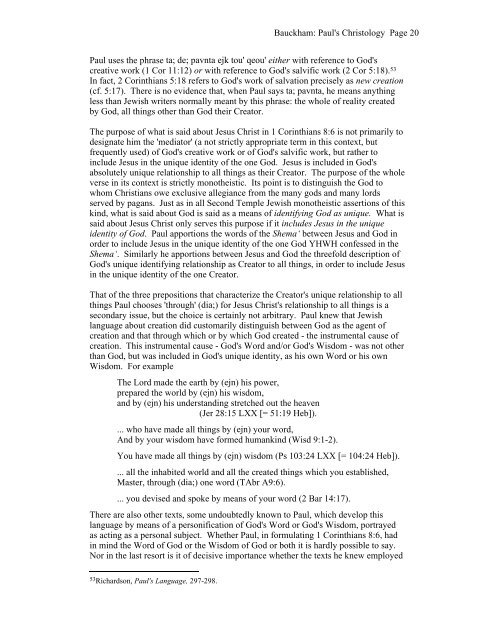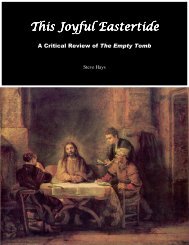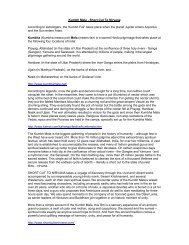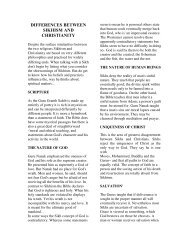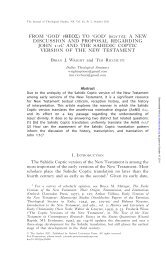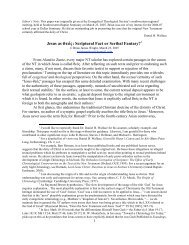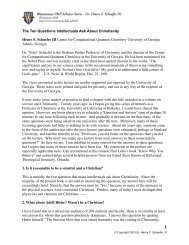Paul's Christology of Divine Identity © Richard ... - For an Answer
Paul's Christology of Divine Identity © Richard ... - For an Answer
Paul's Christology of Divine Identity © Richard ... - For an Answer
You also want an ePaper? Increase the reach of your titles
YUMPU automatically turns print PDFs into web optimized ePapers that Google loves.
Bauckham: <strong>Paul's</strong> <strong>Christology</strong> Page 20<br />
Paul uses the phrase ta; de; pavnta ejk tou' qeou' either with reference to God's<br />
creative work (1 Cor 11:12) or with reference to God's salvific work (2 Cor 5:18). 53<br />
In fact, 2 Corinthi<strong>an</strong>s 5:18 refers to God's work <strong>of</strong> salvation precisely as new creation<br />
(cf. 5:17). There is no evidence that, when Paul says ta; pavnta, he me<strong>an</strong>s <strong>an</strong>ything<br />
less th<strong>an</strong> Jewish writers normally me<strong>an</strong>t by this phrase: the whole <strong>of</strong> reality created<br />
by God, all things other th<strong>an</strong> God their Creator.<br />
The purpose <strong>of</strong> what is said about Jesus Christ in 1 Corinthi<strong>an</strong>s 8:6 is not primarily to<br />
designate him the 'mediator' (a not strictly appropriate term in this context, but<br />
frequently used) <strong>of</strong> God's creative work or <strong>of</strong> God's salvific work, but rather to<br />
include Jesus in the unique identity <strong>of</strong> the one God. Jesus is included in God's<br />
absolutely unique relationship to all things as their Creator. The purpose <strong>of</strong> the whole<br />
verse in its context is strictly monotheistic. Its point is to distinguish the God to<br />
whom Christi<strong>an</strong>s owe exclusive allegi<strong>an</strong>ce from the m<strong>an</strong>y gods <strong>an</strong>d m<strong>an</strong>y lords<br />
served by pag<strong>an</strong>s. Just as in all Second Temple Jewish monotheistic assertions <strong>of</strong> this<br />
kind, what is said about God is said as a me<strong>an</strong>s <strong>of</strong> identifying God as unique. What is<br />
said about Jesus Christ only serves this purpose if it includes Jesus in the unique<br />
identity <strong>of</strong> God. Paul apportions the words <strong>of</strong> the Shema‘ between Jesus <strong>an</strong>d God in<br />
order to include Jesus in the unique identity <strong>of</strong> the one God YHWH confessed in the<br />
Shema‘. Similarly he apportions between Jesus <strong>an</strong>d God the threefold description <strong>of</strong><br />
God's unique identifying relationship as Creator to all things, in order to include Jesus<br />
in the unique identity <strong>of</strong> the one Creator.<br />
That <strong>of</strong> the three prepositions that characterize the Creator's unique relationship to all<br />
things Paul chooses 'through' (dia;) for Jesus Christ's relationship to all things is a<br />
secondary issue, but the choice is certainly not arbitrary. Paul knew that Jewish<br />
l<strong>an</strong>guage about creation did customarily distinguish between God as the agent <strong>of</strong><br />
creation <strong>an</strong>d that through which or by which God created - the instrumental cause <strong>of</strong><br />
creation. This instrumental cause - God's Word <strong>an</strong>d/or God's Wisdom - was not other<br />
th<strong>an</strong> God, but was included in God's unique identity, as his own Word or his own<br />
Wisdom. <strong>For</strong> example<br />
The Lord made the earth by (ejn) his power,<br />
prepared the world by (ejn) his wisdom,<br />
<strong>an</strong>d by (ejn) his underst<strong>an</strong>ding stretched out the heaven<br />
(Jer 28:15 LXX [= 51:19 Heb]).<br />
... who have made all things by (ejn) your word,<br />
And by your wisdom have formed hum<strong>an</strong>kind (Wisd 9:1-2).<br />
You have made all things by (ejn) wisdom (Ps 103:24 LXX [= 104:24 Heb]).<br />
... all the inhabited world <strong>an</strong>d all the created things which you established,<br />
Master, through (dia;) one word (TAbr A9:6).<br />
... you devised <strong>an</strong>d spoke by me<strong>an</strong>s <strong>of</strong> your word (2 Bar 14:17).<br />
There are also other texts, some undoubtedly known to Paul, which develop this<br />
l<strong>an</strong>guage by me<strong>an</strong>s <strong>of</strong> a personification <strong>of</strong> God's Word or God's Wisdom, portrayed<br />
as acting as a personal subject. Whether Paul, in formulating 1 Corinthi<strong>an</strong>s 8:6, had<br />
in mind the Word <strong>of</strong> God or the Wisdom <strong>of</strong> God or both it is hardly possible to say.<br />
Nor in the last resort is it <strong>of</strong> decisive import<strong>an</strong>ce whether the texts he knew employed<br />
53 <strong>Richard</strong>son, <strong>Paul's</strong> L<strong>an</strong>guage, 297-298.


